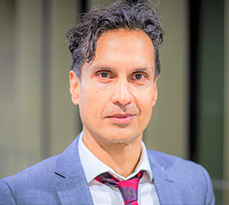Research co-authored by Professor Shaz Ansari of Cambridge Judge examines the moral issues faced by ageing societies in providing palliative care, calling for a ‘holistic’ debate. The study is named ‘EGOS Paper of the Year’ by the European Group for Organizational Studies.
A lack of resources in ageing populations

Ageing societies such as those in Germany, Italy and Japan face the grand challenge of providing adequate palliative or end-of-life care, given strained resources and an increasing number of older individuals. So how should society, carers and even dying people themselves deal with this sobering moral dilemma?
A study that tackles this issue co-authored by Shaz Ansari, Professor of Strategy & Innovation at Cambridge Judge Business School, has just been named “EGOS Paper of the Year” by the European Group for Organizational Studies at its annual Colloquium in Vienna this month. The annual award honours papers that “demonstrate methodological rigor, theoretical relevance, innovativeness, and new insights into organisational phenomenon”.
The paper says that as the word “palliative” (which derives from the Latin word for “to cloak”) implies, carers’ temporal work to alleviate the moral dilemma of rationing time for end-of-life patients “covers up the ‘symptoms’ of the economised palliative care system by routinising the physically weak into becoming ‘patients’. However, this does not solve the actual problem of finding more appropriate ways to treat terminally ill patients.”
Improving end-of-life care
So the paper argues for a “holistic societal debate about palliative care in ageing societies”. The authors found, surprisingly for them, that many patients were willing to discuss the matter: “As the setting of palliative care seemed so detached from daily lives we expected ‘closed doors’ but were overwhelmed by the openness of individuals to share their experiences.”
The paper is based on a three-year study of palliative care in Germany (in hospitals, care facilities, and patients’ homes) including six months of observations, 64 in-depth interviews, and access to patients’ diaries and chat groups from volunteers and staff.
Staff involved in palliative care, who were “deeply affected” by the dilemma posed between the needs of individual patients and the cost-efficiency demands of treating many patients, made a conscious effort to inform patients of this situation.
“Staff engaged in three steps of temporal work for each patient who entered palliative care: increasing patient’s awareness of the moral conflict between linear and process time when they joined, redefining morality attached to opposing times, and enabling patients to attach a new morality to time.”
Increasing patients’ empathy and understanding
Among techniques used by staff was the use of “temporal buffers” consisting of volunteers to cater to patients needs when regular staff was unavailable; through such buffers, “patients started to accept that the moral dilemma faced by staff could not entirely be solved in their favour”. Staff also made patients realise the critical situations faced by other patients (such as lack of breathing). “Through the experience of temporal urgency, patients either became empathetic towards others and regarded this as moral, or supported the need for doctors to prioritise emergency cases (they could also face emergencies).”
“We observed patients subscribing to a new morality of time,” the authors found, as patients no longer perceived different priorities as necessarily “oppositional”.
“As a result of this change in patients’ values on time, staff’s moral dilemma was alleviated, i.e., staff were still aware that the moral dilemma was not resolved, but since patients had changed their view on it, staff was assured that conflict was alleviated and patients became more appreciative of their work.” Thus, the authors challenge the assumption that resolving temporal conflicts in organisations in necessarily desirable, saying that “a moral perspective problematises this assumption.”
The study – entitled “Experiencing time like Groundhog Day? Uncovering the morality of temporal orders in end-of-life care” – is co-authored by Patricia Hein of Ivey Business School, University of Western Ontario, and Shaz Ansari of Cambridge Judge Business School.


